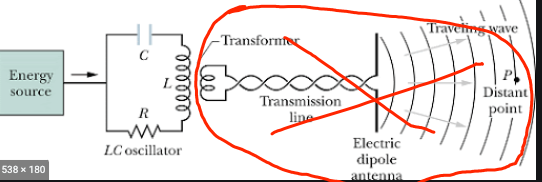Just shown as the above picture, if the right part removed, would electromagnetic waves still be produced near the inductor and what the changing electromanetic field are in this situation? I used to watch some video to explain EM waves by the similar circuit, in witch he says the EM waves could not detached from the circuit if there is no antenna, I don't believe the EM waves are detached from the circuit, the word detach is really confusing. I do believe the LC circuit without antenna will propagate less energy out but don't know why. Could Maxwell's Equations help to modeling all these situation?
-
$\begingroup$ I’m sure they produce a changing em field. But remember that radiation has a particular form of the field. It goes as $1/r$ and thus carries energy to large distances. This could be what they mean by “detach” $\endgroup$– Superfast JellyfishCommented Jun 3, 2020 at 6:46
-
$\begingroup$ Could I say that em filed is also wave, If so whether this wave is deduced from the maxwell's equations just like many videos couses saying, and the special form em field as you mentioned could also be called a special form of em wave? $\endgroup$– DictatorCommented Jun 3, 2020 at 7:31
-
$\begingroup$ @SuperfastJellyfish This is a em wave equation derivation video, youtu.be/8kcvyoHsXrw $\endgroup$– DictatorCommented Jun 3, 2020 at 8:25
2 Answers
...if the right part removed, would electromagnetic waves still be produced near the inductor and what the changing electromanetic field are in this situation?
Every accelerated electron emits EM radiation. If you operate an LC circuit with its oscillating current, the electrons are accelerated back and forth and emit photons. In addition, the charges in the inductor undergo a circular (more precisely, helical) movement, which causes the electrons - an acceleration even in direct current - to radiate. To cut a long story short: When you start an electric current, you lose energy in the form of emitted photons.
I used to watch some video to explain EM waves by the similar circuit, in witch he says the EM waves could not detached from the circuit if there is no antenna,...
This is a technical view of what is happening. A radio engineer is interested in getting a strong signal from an antenna. Of course he cares about losses within the electronics, but the "real" radio wave is the only thing he needs. Even an LC-circuit with a lousy efficiency radiates radiation, whether the antenna has the right length (resonant to the wave generator) or not.
I don't believe the EM waves are detached from the circuit, the word detach is really confusing. I do believe the LC circuit without antenna will propagate less energy out but don't know why.
It all depends on the effective resistance of the circuit. The resistance is responsible for the energy losses, be it the radiated radio wave or the heat radiated by all elements of the circuit. Whether an LC circuit without an antenna connected to it loses more or less energy than with, it depends on the components, frequency and power of the generator.
-
$\begingroup$ Ok, many thanks, I think I have built some rough mind model after Google around, that is em field propagate in the form of wave, em radiation is special form of em wave. near-field doesn't take energy away from the source and far-field takes energy away from the source. far-field is also called em radiation. Changing em field means these changes could propagate at the speed of light but this kind of propagation does not necessarily be em radiation. Only the em field detached from the source becomes em radiation. $\endgroup$– DictatorCommented Jun 4, 2020 at 5:56
-
$\begingroup$ Nice answer. Here is an interesting one physics.stackexchange.com/questions/556603/… $\endgroup$ Commented Jun 7, 2020 at 16:17
An antenna radiates more energy than the plates of a capacitor; the radiation resistance of a capacitor and wires is small, therefore it is not as efficient at radiating energy like an antenna, and a lot of power would have to be driven into the circuit to radiate the same amount of power that a dipole would due to the poor efficiency and directivity. The radiation resistance becomes greatest when the element is the length of a wavelength, and due to this you'd get the greatest radiation efficiency compared to the loss resistance.

